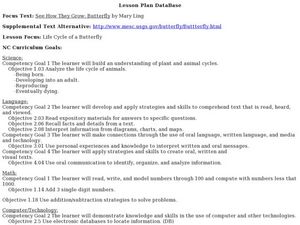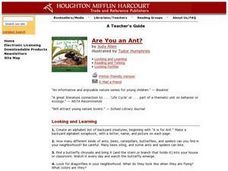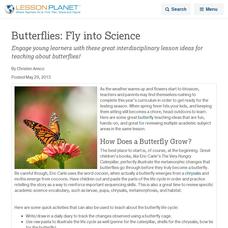Curated OER
The Sun and Moon
Students understand basic concepts about Earth, the Sun and the Moon,
such as relative movement and the phases of the moon. Through discussion, looking at pictures, listening to Native American stories, observing, and building models,...
Curated OER
An Apple a Day
Students explore the Johnny Appleseed story. In this service learning lesson, students sequence the life cycle of apple trees and recognize how Johnny Appleseed worked as a philanthropist.
Curated OER
Araceli Solis Butterflies Unit
Third graders study the life cycle, eating habits, habitats, and migration patterns of butterflies in this series of lessons.
Curated OER
Lesson 2 Its a Small World (Day 2)
Students are able to explain how the water cycle recycles the earth's water supply. They are able to make use of the knowledge of land forms learned in social studies. Students are able to form a hypothesis on how/why the water cycle...
Curated OER
Rain On
Fourth graders study the water cycle and clouds. In this water cycle and cloud lesson, 4th graders determine the definition of condensation and watch a demonstration in which the teacher makes a cloud in a bottle. They discuss the water...
Curated OER
See how They Grow: Butterfly
Students view butterflies and participate in a butterfly activity to learn needed vocabulary. In this butterfly life cycle instructional activity, students access prior knowledge of butterflies. Students listen to a butterfly life...
Curated OER
A Bugs Life: Diary of an Insect's Metamorphosis
Students play games to learn about the life stages and metamorphosis of different insects. In this insects lesson plan, students discuss the life of insects, and then play matching, vocabulary, and memory games.
Curated OER
Are You an Ant?
Learners investigate different insects in their backyard. In this insect lesson plan, students read the book Are You and Ant? and apply the reading to their backyards. Learners create a list of animals that begin with the the letter A an...
Curated OER
Phases of the Moon
In this moon phases instructional activity, students learn about the different phases that the moon goes through. They then use the information the learned to answer the 9 questions in the packet. The answers are on the last page.
Curated OER
A Moon with a View
Third graders explore the rotation of Earth and the moon. In this solar system lesson, 3rd graders participate in an Earth and moon simulation in which part of the class "becomes" the sun, while other children represent the moon by...
Curated OER
Watershed Landscape
Students demonstrate how water flows by building a human watershed using themselves. In this ecology lesson, students compare and contrast point-source and non-point source pollution. They write what they have learned from this activity...
Curated OER
The Dirt on Plants
Students draw and label the four parts of a plant. They describe changes that are part of the common life cycle. Students follow various one and two step directions. They are asked to discuss that they can recall about plants.
Curated OER
Definition of Science Terms
In this water vocabulary worksheet, students read and learn 12 words that pertain to water and the water cycle. Each word and definition is printed on a separate page in a snowflake shape.
Virginia Department of Education
Cell Division
Searching for simple ways to teach mitosis to high schoolers? Using colored chalk and onion root tips, pupils visually demonstrate what they view when looking through the lens of a microscope. There are also various ways to expand the...
Curated OER
Butterflies: Fly into Science
Engage young learners with these great interdisciplinary lesson ideas for teaching about butterflies!
Virginia Department of Education
Weather Patterns and Seasonal Changes
Get your class outside to observe their surroundings with a lesson highlighting weather patterns and seasonal changes. First, learners take a weather walk to survey how the weather affects animals, people, plants, and trees during...
Laboratory for Atmospheric and Space Physics
Polar Vortex Interactive
An interactive lesson places pupils as scientists who must learn why the ozone layer is being destroyed by analyzing the data from multiple satellites. The first analysis shows how UV is related to the ozone cycle. The second...
CK-12 Foundation
Seasonal Changes in Plants: Leaf Pigment
Leaves fall off the tree in the autumn, but why do they change colors? The interactive covers the role of chlorophyll and photosynthesis. It also explains both carotenoids and anthocyanins.
American Museum of Natural History
What Do You Know About Stars?
Illuminate the information about stars. Pupils respond to 10 multiple choice questions about stars. The questions cover topics such as the size of the Milky Way Galaxy, the Sun, and the life cycle of a star. The resource works as a...
Biology Junction
Mutations
Are you a mutant? Learn about multiple types of mutations with a presentation to discover the answer. Both genes and chromosomes mutate at various points in their life cycles. Slides describe each type and the resulting impact on...
Curated OER
Autumn
Take a walk through the forest as the leaves change color and fall from the trees, making way for a new ecosystem cycle to cycle through. An inquiry-based lesson plan examines how the process of decomposition eliminates tons of...
Curated OER
April Showers Bring May Flowers
In this water cycle worksheet, young scholars use a specified internet site to learn about the water cycle. They answer five multiple choice questions about the water cycle.
Curated OER
"Leaf" It in Your Yard
Students research about the process of composting. Students apply their research by creating a compost pile at school that will be maintained once or twice a month for the remainder of the school year.
Curated OER
The Science of Aging
Students reflect on the lives of older people they know, then research and debate the key issues surrounding scientific experimentation in anti-aging. They write a short story that reflects their own philosophical beliefs on aging and...























